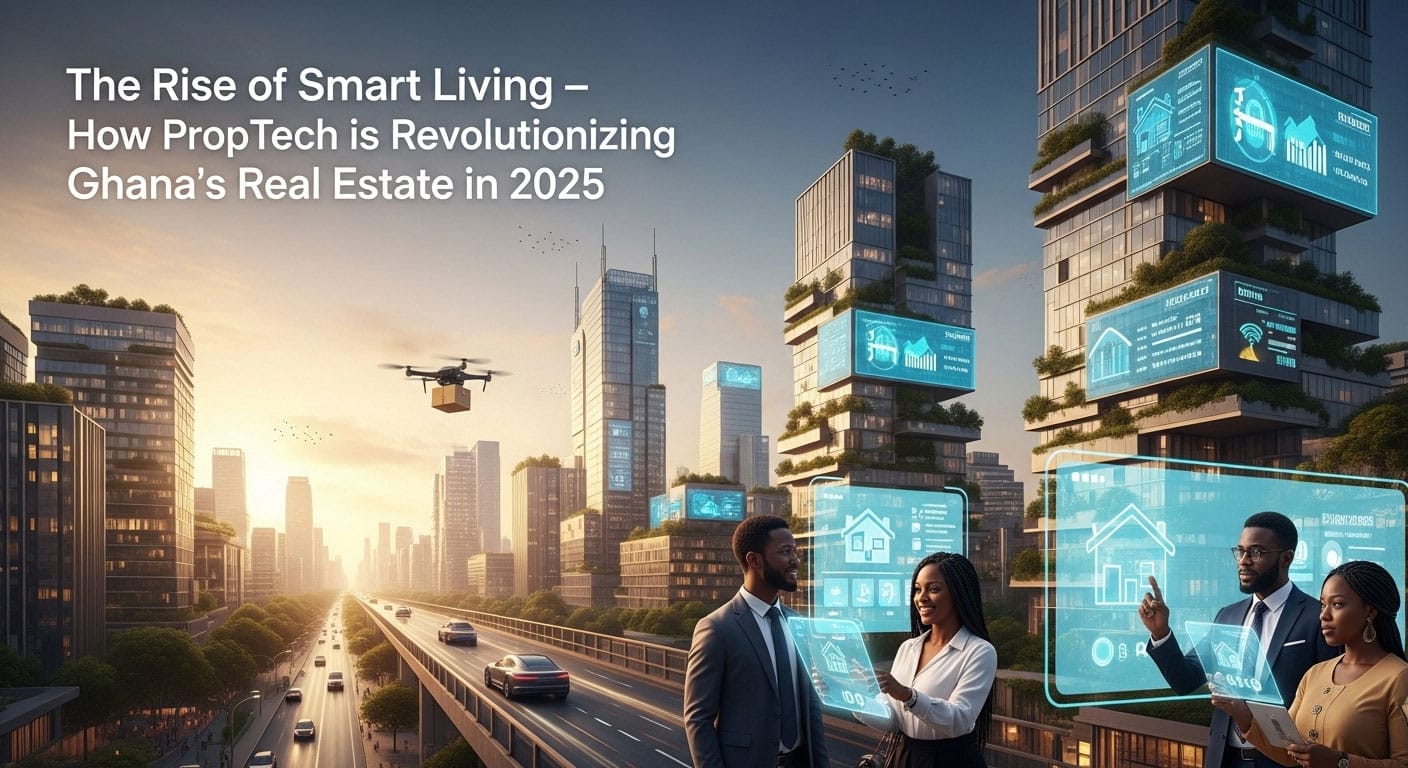Introduction: From Real Estate to Real Intelligence
Real estate in Ghana in Ghana is no longer just about land and cement—it’s about data, automation, and control. In 2025, PropTech (Property Technology) is reshaping how homes are built, bought, sold, and lived in.
From AI-powered Smart homes to digital land registries, Ghana’s developers are catching up—and in some cases, leaping ahead. The convergence Digital transformation of real estate estate and technology isn’t just a trend. It’s a paradigm shift that is redefining expectations for comfort, security, energy efficiency, and return on investment.
What Is PropTech?
At its core, PropTech is the application of technology to real estate processes. It covers:
- Smart homes with automated lighting, climate control, and security systems.
- Virtual reality property tours.
- Online platforms for property management and sales.
- AI tools for pricing, tenant screening, and investment forecasting.
- IoT integration for utilities, maintenance, and energy monitoring.
In Ghana, PropTech is moving from novelty to necessity—especially in luxury developments and investor-driven housing models.
Developers Leading the Digital Charge
Quao Realty: Pioneering Smart Elegance
Quao Realty is emerging as a leader in smart home integration. Their Britton’s Residence project incorporates fully integrated smart home features, offering both basic and advanced tech to meet the demands of a discerning global clientele.
From remote access lighting and AC controls to voice-activated security, Quao is setting a new standard. Their “taking real estate personal” mantra translates into digital personalization—where every resident has control, insight, and comfort at their fingertips.
VAAL Ghana: AI-Powered Homes
VAAL is going further by embedding AI-powered systems into entire home ecosystems—learning behavioral patterns to optimize comfort, reduce energy waste, and enhance security. These homes think, adapt, and evolve—offering a dynamic living experience unheard of just a few years ago in Ghana.
Clifton Homes: Digital Resident Experiences
Clifton Homes isn’t just focused on construction tech—they’re building digitally enhanced resident communities. From pre-handover apps to manage documentation and updates, to post-handover platforms for facility management, rent collection, and maintenance, technology is infused into the full homeowner lifecycle.
The Value Proposition: Why Buyers Love Smart Homes
Smart features aren’t just bells and whistles—they enhance value, safety, efficiency, and satisfaction. In a survey of Ghanaian diaspora buyers:
- 72% said smart home features were “very important” to their purchase decision.
- 64% said remote monitoring and control were crucial for peace of mind.
- 81% were more likely to rent out smart-enabled units, expecting higher yields.
This confirms what developers like Devtraco Plus and Quao Realty already know: buyers are not just buying homes—they’re buying data, control, and confidence.
The New Era of Virtual Real Estate
2025 has also seen virtual property tours become mainstream, especially for diaspora investors who buy sight-unseen. Developers are offering 360° walkthroughs, interactive room planning, and even AR staging of interiors—transforming the buying process into an immersive digital journey.
Online platforms are now doing what realtors did a decade ago—matching buyers and properties via AI-enhanced recommendation engines and predictive pricing tools.
Sustainability Meets Smart Tech
Smart homes are not just luxurious—they are efficient and green. Automated lighting, water-saving fixtures, solar integration, and usage analytics help reduce carbon footprints and utility costs. For developers pursuing EDGE certification or ESG benchmarks, PropTech is now an essential partner.
For instance, The Pelican by Devtraco Plus uses smart utility systems to increase efficiency and attract eco-conscious investors.
Challenges on the Digital Front
Despite the promise, challenges remain:
- Internet reliability and power stability can limit adoption outside core urban zones.
- Cost of implementation raises property prices, making smart homes still rare in the affordable segment.
- Data privacy and security concerns must be addressed as more systems go online.
But these are speed bumps, not roadblocks. As Ghana’s digital infrastructure improves and more tech-savvy buyers enter the market, PropTech will become standard—not optional.
Conclusion: The Future Lives Here
The smart home is not a futuristic fantasy—it’s already here, rising in Accra, Cantonments, East Legon, and beyond. Ghana’s PropTech wave is not just digitizing real estate—it’s humanizing it. Homes are becoming intuitive, investment processes more transparent, and living more connected.
In 2025, one truth rings clear:
In Ghana, the smartest homes are leading the smartest investments.





